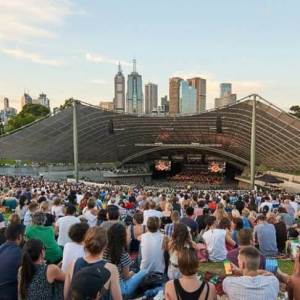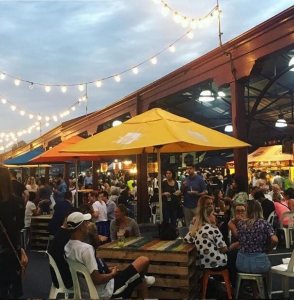Whether you’re a local or just visiting for a weekend, Melbourne in the summertime is a buzzing hub of entertainment for all to enjoy. The city is continuing to develop its accessibility so that no one misses out on enjoying its incredible events. Melbourne is notorious for its incredible food and drink, theatre, arts and sports culture as well as its unique graffiti laneways! While the weather can often be unpredictable, boasting ‘four seasons in a day,’ you can always find something to do.
If you’re stuck for ideas, here are our top picks for accessible fun this summer in Melbourne:
1. Australian Open

In the last fortnight of January, every year the Australian Open takes place and thousands of spectators head to Melbourne Park to watch tennis superstars from around the world compete. The event features men’s and women’s singles, men’s, women’s and mixed doubles, juniors and wheelchair championships. If you can’t brave the heat throughout a game, you can cool down in the shade and enjoy live music in the grounds of Birrarung Marr. The Australian Open Festival now features a little something for everyone, including food stalls, live screenings of matches and endless entertainment. For more information on wheelchair access, see here.
2. Melbourne Arts Precinct

The Melbourne Arts Precinct is not a place to be missed this summer! It’s home to the most visited art gallery and busiest performing arts centres in Australia. Whether you’re interested in stopping by the NGV to gaze on a spectacular curatorship of artworks, Hamer Hall for the relaxing sounds of classical, or Southbank Theatre for a quirky, local performance – the Arts Precinct presents up to 3000 performances and exhibitions every year.
3. Sidney Myer Free Concerts
Located in the Kings Domain Gardens, just a short distance from Flinders Street, the Sidney Myer Music Bowl is one of Melbourne’s best venues for outdoor music.
Every summer, the Melbourne Symphony Orchestra put on a series of free classical concerts. That’s right, free! So why not grab a picnic blanket, friends and family and head on down? Wheelchair seats and spaces are subject to availability so it’s advised to contact the Arts Centre directly on 1300 182 183 to secure your space.
4. Night Markets

Melbourne is famed across the world for its abundant food and drink scene. One of the best ways to experience some of the most delectable dishes from across the city is by making your to the Queen Victoria and South Melbourne Night Markets.
These markets are full of vibrant entertainment from live bands to silent discos tours. While sipping on a cold refreshing beverage or tasting some of the city’s finest cuisines, you can sit back, relax and soak up the lively atmosphere.
5. IMAX Melbourne
If you find the temperatures are soaring and you’re in need of some escapism this summer, immerse yourself in the cinematic world of IMAX. Melbourne’s IMAX cinema is located inside Melbourne Museum at Carlton Gardens. Unlike other cinematic experiences, IMAX is bigger, better and takes entertainment to the next level with 3D imagery and heart-pounding surround sound. You can purchase a wheelchair accessible ticket online by selecting it on the IMAX seat map, or call their box office directly on 9663 5454. See the latest movie releases here.
Read more in our blog about Accessible Fun and Staying Cool this Summer.
At Life Mobility, we aim to empower people living with limited mobility or a disability to lead active and independent lives. If you need further information about our scooter and wheelchair accessories contact us today or come and talk to our friendly consultants at our Bayswater or Mornington showrooms.



